外研版英语九年级上册期中复习导学案
- 格式:docx
- 大小:22.41 KB
- 文档页数:7
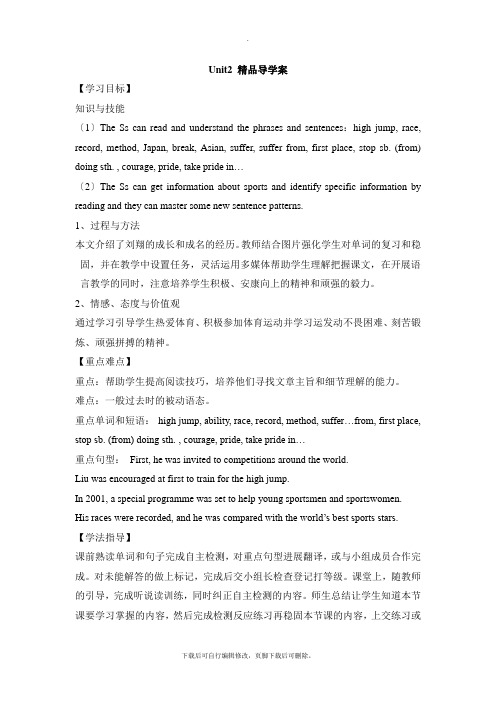
Unit2 精品导学案【学习目标】知识与技能〔1〕The Ss can read and understand the phrases and sentences:high jump, race, record, method, Japan, break, Asian, suffer, suffer from, first place, stop sb. (from) doing sth. , courage, pride, take pride in…〔2〕The Ss can get information about sports and identify specific information by reading and they can master some new sentence patterns.1、过程与方法本文介绍了刘翔的成长和成名的经历。
教师结合图片强化学生对单词的复习和稳固,并在教学中设置任务,灵活运用多媒体帮助学生理解把握课文,在开展语言教学的同时,注意培养学生积极、安康向上的精神和顽强的毅力。
2、情感、态度与价值观通过学习引导学生热爱体育、积极参加体育运动并学习运发动不畏困难、刻苦锻炼、顽强拼搏的精神。
【重点难点】重点:帮助学生提高阅读技巧,培养他们寻找文章主旨和细节理解的能力。
难点:一般过去时的被动语态。
重点单词和短语:high jump, ability, race, record, method, suffer…from, first place, stop sb. (from) doing sth. , courage, pride, take pride in…重点句型:First, he was invited to competitions around the world.Liu was encouraged at first to train for the high jump.In 2001, a special programme was set to help young sportsmen and sportswomen.His races were recorded, and he was compared with the world’s best sports stars.【学法指导】课前熟读单词和句子完成自主检测,对重点句型进展翻译,或与小组成员合作完成。
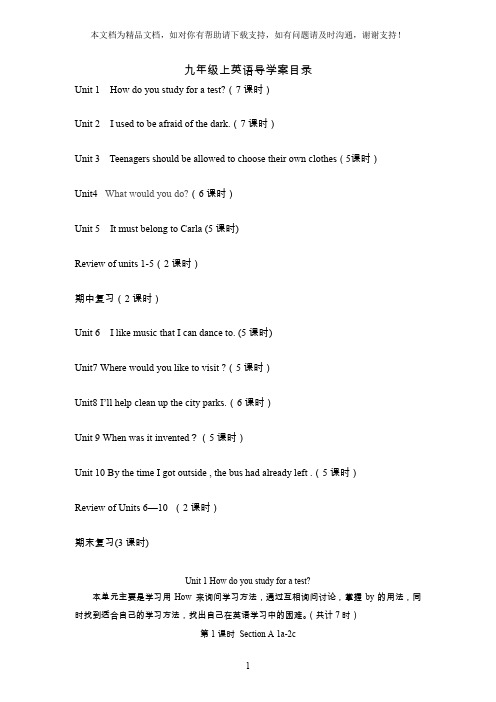
九年级上英语导学案目录Unit 1 How do you study for a test?(7课时)Unit 2 I used to be afraid of the dark.(7课时)Unit 3 Teenagers should be allowed to choose their own clothes(5课时)Unit4What would you do?(6课时)Unit 5 It must belong to Carla (5课时)Review of units 1-5(2课时)期中复习(2课时)Unit 6 I like music that I can dance to. (5课时)Unit7 Where would you like to visit ?(5课时)Unit8 I’ll help clean up the city parks.(6课时)Unit 9 When was it invented?(5课时)Unit 10 By the time I got outside , the bus had already left .(5课时)Review of Units 6—10 (2课时)期末复习(3课时)Unit 1 How do you study for a test?本单元主要是学习用How 来询问学习方法,通过互相询问讨论,掌握by的用法,同时找到适合自己的学习方法,找出自己在英语学习中的困难。
(共计7时)第1课时Section A 1a-2c【学习目标】1掌握新单词flashcard, vocabulary, aloud, pronunciation2熟练运用how 引起的特殊疑问句及by的用法。
3能够听懂有关学习方法的简短对话。
【学习重难点】1熟记重点单词短语。
2语法:by + 动词ing的用法3句型How do you study for a test? I study by working with a group.【学习过程】一课前预习:(教师寄语:预习感知,有备无患。

Module 1 Wonders of the worldUnit 1 It’s more than 2,000 years old.一、学习目标:目标A:认读、理解本课的词汇及短语.目标B:听懂对话大意.目标C:学会带感情地朗读与断句.目标D: 通过对话学会向别人介绍景点.二、问题引领问题A:认读、理解本课的词汇及短语. 〔检查预习内容:翻译重点短语. 1、师友互查重点短语翻译, 学师帮学友纠正发音. 2、抢答环节:抢答翻译以下重点短语〕1. 超过, 多于______________2. 自然奇观___________________3.最神奇的______________________4. 同意某人的意见___________________5. 它们中的大数___________________6. 依某人看来___________________7. 数以百万的__________________问题B:听并完成各项任务〔速读题干, 预测听力内容, 带着问题去听. 〕1. Match the names of the wonders with the pictures on the right and on the next page.Try to read the names of the wonders.2. Look at the pictures and answer the e the words in the box to help you.问题C:听读对话, 完成任务并跟读模仿.1. 听Activity 3, 完成以下任务.1) What are they mainly talking about? ( ) A. Natural wonders B. Man-made wonders C. Both A and B2)In Betty’s opinion,_________ wonders are more exciting than _______ ones.3)Is the Three Gorges Dam a natural wonder or a man-made wonder_________________________.Tony advised his friends ___________ Wonders of the World and joined ____ the discussion. He thought natural wonders ______more interesting than man-made ones. He also thought the Giant’s Causeway was the ______ fantastic natural wonder.But Lingling wasn’t _____ about it. Because she has never ________ it. She thought Victoria Falls in Africa was _____ more fantastic. It’s about 1,700 metres wide and 100 metres high.That’s huge. However Betty and Daming didn’t agree ______ Tony and Lingling. In ________ opinion,man-made wonders are more exciting ______ natural ones, such as the Terracotta Army、the Three Gorges Dam.三、训练2.用所给词的适当形式填空1) I _____ never _______(be) to America.So I know nothing about it.2) In ______(they) opinion, they should study in groups and help with each other.3) Man-made wonders are ______ (excite)than natural ones.4) Spring is a ____________(wonder)season and every thing comes to life.5) I’m ready for it. I ________(write) down the ideas in the notebook.3.句型转换1) The hole is about 20 metres deep(対画线局部提问). _______ _______is the hole?2〕Let’s go there and join in the discussion.(改为同义句)Let’s go there and _____ _____ ____ the discussion.3〕I’ll write down some ideas about the natural wonders.(用already 改写句子)I ______ already _______ down some ideas about the natural wonders.4〕Though he is very young, he knows much knowledge.(改为同义句)He is very young,________ he knows much knowledge.5〕There are more than two thousand students in our school.(改为同义句)There are ______ two thousand students in our school.4.根据汉语意思完成句子.1)他邀请我们参加讨论. He invited us to ____ ______ the discussion.2)我不同意你的观点, 我有更好的方法. I don’t _______ ________ you and I have better ideas.3)在我看来, 那个故事的结局并不完美. ___ _____ _______, the ending of the story is not perfect.4)那些书花了我200多元. Those books cost me _____ ______ 200 yuan.5)我已经给迈克写过信了, 但是我还没有把它寄给他.I _____ already ______ letter to Mike, but I _____ _______ it to him.Unit 1学习目标一、掌握本单元including, attend, whatever, give up等单词和短语. 〔重点〕二、掌握并灵活运用以下句子:〔重点〕1. Whatever she does , she never give up !2. That’s amazing.三、听懂有关英雄人物的对话并能流利地介绍自己喜欢的名人.自主预习新词自测读写单词或短语并熟记看谁记得快.1.包含;包括prep.2.出席;参加v.3.在国外;到国外adv.5.不管怎么样conj.7.意志;决心n. 8.获胜;胜利n.9.实在;确实adv. 10.惊人的adj.课堂导学1. Whatever she does , she never give up .无论她做什么, 她从来都不放弃.单词1:Whatever 无论什么;不管怎么样Whatever作连词, 意为“无论什么;不管怎么样〞, 在本句中引导状语从句. whatever相当于no matter what, 还可以引导主语从句, 也可引导宾语从句.happens , stay calm.不管发生什么情况, 保持镇静.归纳:类似whatever的词还有:wherever无论在哪里, however然而, whoever无论, whenever谁无论何时等. You can go wherever you like.你可以去你喜欢的任何地方Whoever comes will be welcome.不管谁来都欢迎短语1:give up放弃give up, 意为“放弃〞, 后接名词、代词或动名词作宾语. give up为动副结构的短语, 当宾语为代词时, 代词要放在短语中间.Tom isn’t good at math , but he won’t汤姆不善长数学, 但他不会放弃数学的To keep healthy , you should smoking要想保持健康, 你应该戒烟即学即练一一、单项选择- Why did your uncle finally such a good chance to work abroad?- Because he wanted to do more for our country.A. look upB. make upC. give upD. use up二、按要求完成句子改为同义句.Whatever he says , she will agree with him (改为同义句)he says , she will agree with him.2. Well, I think she’s a good student as well as a good player.嗯, 我认为她不仅是一名优秀的运发动, 而且还是一名好学生.短语2:as well as 也;不仅……而且……as well as, 意为“也;不仅……而且……〞, 常用来连接两个并列的成分, 强调as well as前面的内容. as well as连接两个名词、代词等作主语时, 谓语动词跟as well as前面的词在人称和数上保持一致.Bob can speak Spanish English.鲍勃不仅会讲英语, 也会说西班牙语.提示:as well as和not only…but also…同义, 但前者的语意重点和后者的语意重点恰好相反.Jennifer can sing as well as dance. 〔强调唱歌〕珍妮弗不但会跳舞, 也会唱歌.Jennifer can not only sing but also dance.〔强调跳舞〕珍妮弗不但会唱歌, 也会跳舞.即学即练二一、单项选择The mother, as well as her two daughters, to the theatre with some friends this evening.A.are goingB.were goingC.is goingD.was goingUnit 2学习目标一、掌握本单元sick, treat, manage, die for , take care of , on one’s own等单词和短语. 〔重点〕二、看懂介绍白求恩的文章并能就自己所学所知写一篇类似的短文.自主预习一、新词自测读写单词或短语并熟记, 看谁记得快.1.加拿大的;加拿大人的adj.2.士兵n.3.伤;伤口n.4.为……而死5.了解;意识到v.6. 垂死的;即将死亡的adj.7. 那时候8. 创造;创造n.9. 做成;〔尤指〕设法完成v.10. 〔使〕继续v.二、用所给词的适当形式填空1. Dr Bethune is one of the most famous (hero) in China.2. He often worked very hard without (rest) or (take) care of himself.3. Once , he managed (save) over a hundred lives.课堂导学1.Dr Bethune developed new ways of taking care of the sick.白求恩大夫开发了新方法来照顾病人.短语1:take care of照顾;护理take care of, 意为“照顾;护理〞其中care为不可数名词, 前面不用冠词修饰. 此短语后面可接名词或代词作宾语, 其同义短语为look after.She stayed at home and her mother yesterday.昨天她待在家里照顾她母亲.短语2:the+形容词某一类人或事物句中the sick, 意为“病人〞. 定冠词the与形容词连用, 表示复数意义的“某一类人或事物〞. 当这种结构作主语时, 谓语动词用复数形式.need us to care about them.盲人需要我们关心他们即学即练一一、单项选择young will like this kind of sport , but old will not.A. A;aB. A;theB.The ; aC. The ; the二、根据汉语意思完成句子当我不在家时, 照顾好你自己.When I’m out , yourself.2. At that time, there were few doctors , so he had to work very hard on his own.那时候, 那儿几乎没有医生, 所以他得努力地单独一人工作.短语3:at that time那时候at that time是固定词组, 意为“那时候〞, 常用于过去时或过去进行时的句子中.She was 86 . 那时她86岁.He was sleeping . 他那时正在睡觉短语4:on one’s own单独一人on one’s own, 意为“单独一人〞, 还可表示“靠自己;独立地〞, 一般用作状语, 相当于by oneself或者alone. Although her father is in the company , Mary got the job 尽管她父亲在这个公司里, 但玛丽是靠自己得到那份工作的.We should do our own things 我们自己的事情应该自己做.即学即练二一、单项选择- What were you doing when I called at 8 p.m. yesterday?- I the piano at that time.A. playB. is playingC. playedD. was playing二、根据汉语意思完成句子学生们应该独立完成他们的家庭作业.Students should finish their homework .3… and managed to save over a hundred lives.……设法挽救了一百多条生命.单词1:manage .做成;〔尤指〕设法完成manage作动词, 意为“做成:〔尤指〕设法完成〞, 其后可接名词、代词或动词不定式, manage to do sth.意为“设法做成某事〞. manage作动词, 还可表示“管理, 经营, 控制〞等后接名词或代词.We the work ahead of time.我们设法提前完成了工作She the shop while the owner was away.店主不在的时候她照管商店即学即练三根据汉语意思完成句子最后警察设法抓住了那个小偷.At last , the policeman the thief.4. In the end , he died of his wound.最后, 他因他的伤口〔感染〕而死.短语5:die of 因……而死, 死于……die of, 意为“因……而死. 死于……〞, 原因常来自内部, 后常接hunger, illness , cancer ,sorrow等名词. Steve jobs illness on October 5, 2021 .史蒂夫乔布斯于2021年10月5日因病逝世.Every year , nearly one million people hunger.每年约有一百万人死于饥饿.拓展:die from的用法die from, 意为“死于……〞原因常来自外部, 由环境造成〔主要指事故等方面的外部原因〕, 后常接accident , overwork , drinking , smoking等名词.即学即练四一、单项选择My grandma died cancer.Unit 3学习目标掌握原因状语从句目的状语从句和结果状语从句的用法. 〔重点〕Many people were dying because they did not get to hospital quickly enough.There were few doctors ,so he had to work very hard on his own.He wrote books so that they could about how he treated the sick.自主预习从方框中选择适当的连词完成句子1. I didn’t know which dictionary was better , I took neither.2. Traffic is heavy and the price of oil is much higher, many people go to work by bus instead.3. Both of his parents work in the city . he lives with his grandparents in the village.4. The teacher speaks loudly the students can hear her clearly.5. If you go to visit London , don’t forget your umbrella it rains a lot there .课堂导学On 12th April 1961, Gagarin took off for space .1961年4月12日,加加林乘宇宙飞船飞往太空.短语1:take off 〔飞机等〕起飞take off是动词短语, 意为“〔飞机等〕起飞〞, 反义词是land. 它还可表示“脱下;取下〞, 反义短语为put on. When will the plane ?飞机何时起飞He his raincoat and took out the key.他脱下雨衣, 拿出钥匙.注意:take off是由“动词+副词〞构成的短语, 当其后接代词时, 代词要放在take和off的中间. 当其后接名词时, 名词放在off的前后均可.Put on your clothes . Don’t take them off.把你的衣服穿上. 别脱下来.即学即练一、单项选择Attention please . The plane will in five minutes.A. take outB. take afterC. take offD. take care二、根据汉语意思完成句子这个人脱下他的毛衣, 出去了.The man his sweater and went out .语法规律总结原因、结果和目的状语从句.1.原因状语从句〔1〕because引导的原因状语从句because作连词, 意为“因为〞, 表示必然的因果关系, 语气较强, 通常放在主句之后, 假设需强调那么放在主句之前, 常用来答复疑问词why提出的问题. because引导的原因状语从句有时可与because of短语换用. because和so在一个句子中不能同时使用.I went to see a doctor because I had a cold.我去看医生, 因为我感冒了.-Why are you anxious?-为什么你很着急-Because my bike is broken.-因为我的自行车坏了.(2) since引导的原因状语从句since, 意为“因为;由于;既然〞, 侧重主句, 从句表示显然的或的理由, 常放在句首.Since we are young , we shouldn’t be afrai d of making mistakes.既然我们还年轻, 我们不该害怕犯错误.2.结果状语从句so常用来连接并列句, 前一分句表示原因, 后一分句表示结果. so和since不能连用.They worked very hard , so they could finish the work before supper.他们拼命地干活, 所以在晚饭前就能把工作做完.It is very cold outside ,so I wore a heavy coat.外边很冷, 所以我穿了一件厚大衣.3.目的状语从句so that 引导的目的状语从句中通常带有can , could , may , might ,should 等情态动词. so that引导的从句在主句后, 从句前不用逗号, 有时可省略that.I will tell you all the facts so that you can judge for yourself.我会告诉你所有的事实以便你可以自己判断.即学即练用so, so that , because , because of 填空1. This meal is my treat , put your money away.2. I get up early I can do some exercise.3. I didn’t eat the fish the smell was terrible.4. David didn’t go to school his illness.。
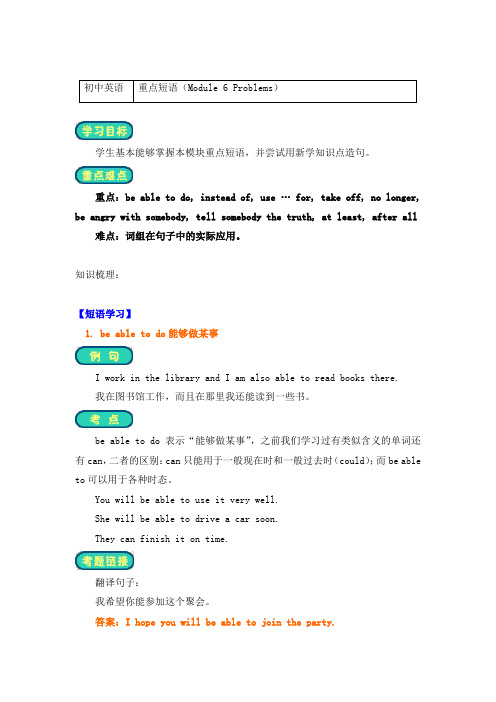
初中英语重点短语(Module 6 Problems)学生基本能够掌握本模块重点短语,并尝试用新学知识点造句。
重点:be able to do, instead of, use … for, take off, no longer, be angry with somebody, tell somebody the truth, at least, after all 难点:词组在句子中的实际应用。
知识梳理:【短语学习】1. be able to do能够做某事I work in the library and I am also able to read books there.我在图书馆工作,而且在那里我还能读到一些书。
be able to do表示“能够做某事”,之前我们学习过有类似含义的单词还有can,二者的区别:can只能用于一般现在时和一般过去时(could);而be able to可以用于各种时态。
You will be able to use it very well.She will be able to drive a car soon.They can finish it on time.翻译句子:我希望你能参加这个聚会。
答案:I hope you will be able to join the party.思路分析:be able to和将来时的结合。
2. instead of替代If you do all these other things instead of your homework, you won’t have time to study.如果你不去做作业,而是做这些其他方面的事情,你就没有时间去学习了。
instead of后面所能跟随的词性有若干种。
Can you go there instead of me?Give me this instead of that.The boy has been playing all afternoon instead of getting on with his study.Things are now better instead of worse.They walked slowly instead of quickly.翻译句子:我们今天不吃肉吃蔬菜好吗?答案:Shall we have vegetables instead of meat today?思路分析:这里instead of所起到的大致就是连接作用。
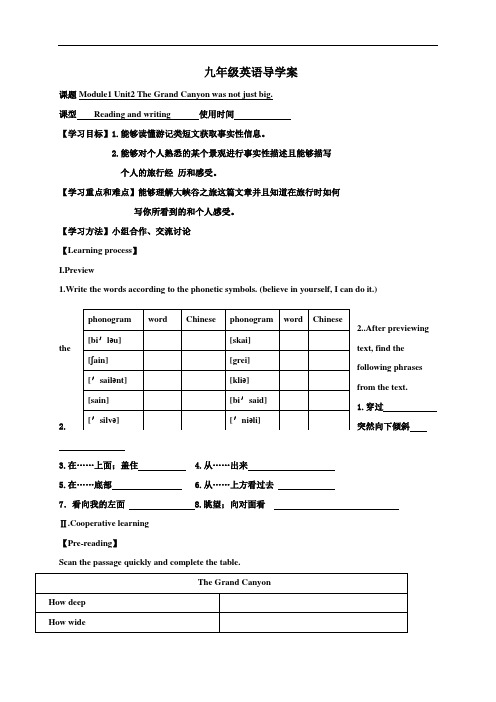
九年级英语导学案课题Module1 Unit2 The Grand Canyon was not just big. 课型Reading and writing使用时间【学习目标】1.能够读懂游记类短文获取事实性信息。
2.能够对个人熟悉的某个景观进行事实性描述且能够描写 个人的旅行经 历和感受。
【学习重点和难点】能够理解大峡谷之旅这篇文章并且知道在旅行时如何 写你所看到的和个人感受。
【学习方法】小组合作、交流讨论【Learning process 】 I.Preview1.Write the words according to the phonetic symbols. (believe in yourself, I can do it.)2..After previewingthetext, find the following phrases from the text.1.穿过2.突然向下倾斜3.在……上面;盖住4.从……出来5.在……底部6.从……上方看过去 7.看向我的左面8.眺望;向对面看Ⅱ.Cooperative learning 【Pre-reading 】Scan the passage quickly and complete the table. The Grand Canyon How deep How widephonogramword Chinese phonogram word Chinese[bi 'l əu] [skai] [ʃain] [grei] ['sail ənt] [kli ə] [sain][bi 'said] ['silv ə]['ni əli]How long【While-reading】Read the passage carefully and choose the correct answer.( )1.Where does the passage most probably come from?A. A magazineB. A grammar bookC.A dictionaryD.A storybook( )2.Why was there nothing to see ?A.Because there was nothing. C.Because it was raining.B.Because it was too dark. D.Because it was in the morning.( )3.Which direction was the writer facing while he/she was looking over the Grand Canyon?A.SouthB.NorthC.EastD.West( )4.What is the writer’s purpose in writing this passage ?A.To give facts about the natural world.B.To say how he feels about the natural world.C. To tell an interesting story about the Grand Canyon.D. To attract people to visit the Grand Canyon.【Post-listening】Complete the passage wit the words in the box.below mile remain reply sign silent sky stream throughIn the dark, there is no (1)________ of the Grand Canyon , and it is (2)________ . But if you(3)_________ by the Grand Canyon as the (4)_________ gets brighter and look down about one(5)_______ , you can the Colorado River (6)________ you. It looks like a silver (7)________ as itpasses (8)________ the rocks at the bottom of the canyon. If someone asks you whether the Grand Canyon is the greatest wonder of the natural world,it may be easy to(9) _________ .【Summary】I study, and I summarize.1.The phrases of describing the Grand Canyon :2.List framework about describing the natural or man-made wonders(activity 6 ):【Classroom consolidation】Ⅰ.Fill in the blanks with the proper form of the given word.1.I have something important (tell) you.2.We (have) a sports meeting in two weeks.3.When I got home, my mother (cook).4.The Changjiang River is (long) river in China.5.What you (do) at five o’clock yesterday afternoon? II. Complete the sentences.1.你可以清晰地看到湖底的鱼。
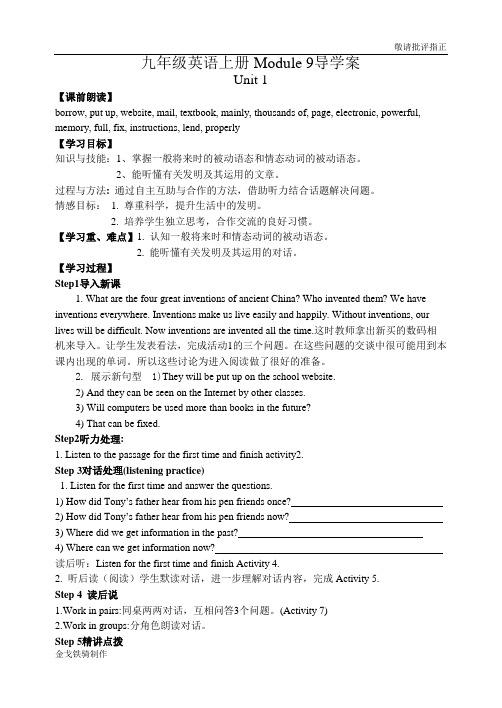
九年级英语上册Module 9导学案Unit 1【课前朗读】borrow, put up, website, mail, textbook, mainly, thousands of, page, electronic, powerful, memory, full, fix, instructions, lend, properly【学习目标】知识与技能:1、掌握一般将来时的被动语态和情态动词的被动语态。
2、能听懂有关发明及其运用的文章。
过程与方法:通过自主互助与合作的方法,借助听力结合话题解决问题。
情感目标:1. 尊重科学,提升生活中的发明。
2. 培养学生独立思考,合作交流的良好习惯。
【学习重、难点】1. 认知一般将来时和情态动词的被动语态。
2. 能听懂有关发明及其运用的对话。
【学习过程】Step1导入新课1. What are the four great inventions of ancient China? Who invented them? We have inventions everywhere. Inventions make us live easily and happily. Without inventions, our lives will be difficult. Now inventions are invented all the time.这时教师拿出新买的数码相机来导入。
让学生发表看法,完成活动1的三个问题。
在这些问题的交谈中很可能用到本课内出现的单词。
所以这些讨论为进入阅读做了很好的准备。
2. 展示新句型 1)They will be put up on the school website.2) And they can be seen on the Internet by other classes.3) Will computers be used more than books in the future?4) That can be fixed.Step2听力处理:1. Listen to the passage for the first time and finish activity2.Step 3对话处理(listening practice)1. Listen for the first time and answer the questions.1) How did Tony’s father hear from his pen friends once?2) How did Tony’s father hear from his pen friends now?3) Where did we get information in the past?4) Where can we get information now?读后听:Listen for the first time and finish Activity 4.2. 听后读(阅读)学生默读对话,进一步理解对话内容,完成Activity 5.Step 4 读后说1.Work in pairs:同桌两两对话,互相问答3个问题。

九上外研英语期中考试复习讲义(教师版)过去进行时的用法构成(谓语):was/were doing用法:表示过去某一时刻或某段时间内正在进行或发生的动作或所处的状态。
标志词:at this time, yesterday;由when/while引导的时间状语从句。
题一:翻译:1.昨天的这个时候我正在玩电脑游戏。
I was playing computer games at this time yesterday.2.—Why was your class so lively, Mr. Li?—Oh, my students _______ in groups about the coming school trip. 选CA. discussB. are discussingC. were discussingD. have discussedhas gone to的用法have(has)gone to表示现在去了某地,已经到达目的地或在途中,现在还没有回来。
have (has) been to表示“曾经去过,现在已经回来”。
have (has) been in表示“在某地呆多长时间”,常与表示一段时间的状语连用。
题二:翻译:1.汤姆在哪里?他到书店去了。
—Where’s Tom?—He has gone to the book store/shop.2.玛丽从未去过长城。
Mary has never been to the Great Wall.3.布朗先生来上海已经有三天了。
Mr. Brown has been in Shanghai for three days.4.—Could you tell me where Jim is? I want to return the bicycle to him.—Oh, he _____the library. He will be back soon. 选BA. goes toB. has gone toC. has been toD. went tothousands of 的用法解题口诀:前有数,无“S”,无“of”;前无数,有“S”,有“of”。
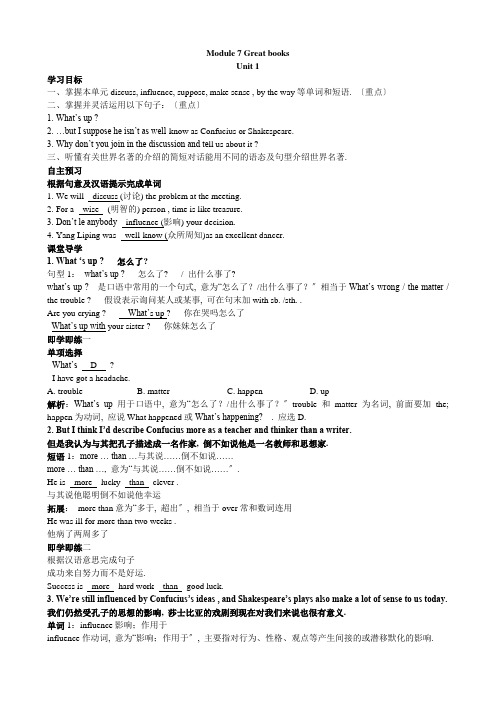
Module 7 Great booksUnit 1学习目标一、掌握本单元discuss, influence, suppose, make sense , by the way等单词和短语. 〔重点〕二、掌握并灵活运用以下句子:〔重点〕1. What’s up ?2. …but I suppose he isn’t as well-know as Confucius or Shakespeare.3. Why don’t you join in the discussion and te ll us about it ?三、听懂有关世界名著的介绍的简短对话能用不同的语态及句型介绍世界名著.自主预习根据句意及汉语提示完成单词1. We will discuss (讨论) the problem at the meeting.2. For a wise (明智的) person , time is like treasure.3. Don’t le anybody influence (影响) your decision.4. Yang Liping was well-know (众所周知)as an excellent dancer.课堂导学1. What ‘s up ? 怎么了?句型1:what’s up ? 怎么了? / 出什么事了?what’s up ? 是口语中常用的一个句式, 意为“怎么了?/出什么事了?〞相当于What’s wrong / the matter / the trouble ? 假设表示询问某人或某事, 可在句末加with sb. /sth. .Are you crying ? What’s up ? 你在哭吗怎么了What’s up with your sister ? 你妹妹怎么了即学即练一单项选择- What’s D ?- I have got a headache.A. troubleB. matterC. happenD. up解析:What’s up用于口语中, 意为“怎么了?/出什么事了?〞trouble 和matter为名词, 前面要加the; happen为动词, 应说What happened或What’s happening?. 应选D.2. But I think I’d describe Confucius more as a teacher and thinker than a writer.但是我认为与其把孔子描述成一名作家, 倒不如说他是一名教师和思想家.短语1:more … than …与其说……倒不如说……more … than …, 意为“与其说……倒不如说……〞.He is more lucky than clever .与其说他聪明倒不如说他幸运拓展:more than意为“多于, 超出〞, 相当于over常和数词连用He was ill for more than two weeks .他病了两周多了即学即练二根据汉语意思完成句子成功来自努力而不是好运.Success is more hard work than good luck.3. We’re still influenced by Confucius’s ideas , and Shakespeare’s plays also make a lot of sense to us today.我们仍然受孔子的思想的影响, 莎士比亚的戏剧到现在对我们来说也很有意义.单词1:influence影响;作用于influence作动词, 意为“影响;作用于〞, 主要指对行为、性格、观点等产生间接的或潜移默化的影响.Colors influence our moods.颜色影响我们的情绪We became best friends and he influenced me deeply.我们成了最好的朋友他深深地影响了我拓展:influenced还可作名词, 意为“影响力;作用;有影响的人或物〞. Have an influence on ….表示“对……有影响〞.Television has a strong influence on people.电视对人有很大的影响短语2:make sense 合情理;明智;有意义Make sense是固定词组, 意为“合情理;明智;有意义〞.It all started to make sense .这一切都开始变得有意义This doesn’t make sense .这一点儿都不合理即学即练三一、根据句意及汉语提示完成单词People not only in China but also from many other countries are still influenced (受影响) by Confucius’s thoughts.二、根据汉语意思完成句子这句话没什么意义.This sentence doesn’t make sense .4. By the way , what do you think of Mark Twain , the great American writer in the nineteenth century? 顺便问一下, 你认为19世纪伟大的美国作家马克·吐温怎么样?短语3:by the way顺便提一下by the way, 意为“顺便提一下〞, 常作插入语, 用于在交谈中插入新话题、题外话或评论.By the way , have you seen the film?顺便问一下, 你看过这部影片吗?归纳:与way相关的短语in the way挡路on the way… 在去……的路上in this way用这种方式in a way在某种意义上all the way自始至终!即学即练四单项选择D , do you know which bike is his?A. In the wayB. On the wayC. By wayD. By the way解析:in the way, 意为“挡路〞, on the way意为“在路上〞;C项表达错误, by the way意为“顺便说一句, 顺便问一下〞. 句意为“顺便问一下, 哪辆自行车是他的?〞应选D.Unit 2学习目标一、掌握本单元adventure, escape, run away , be surprised to do sth. , pay for 等单词和短语. 〔重点〕二、能听懂读懂评价名著的文章根据本单元学到的知识和自己的体会写一篇介绍名著作品的短文.自主预习新词自测读写单词或短语并熟记看谁记得快get into trouble2.逃走;逃跑run away3.逃离;逃脱v. escapen. cave5.死的;去世的adj. deadn. neighbouradj. aliven. dialogue课堂导学1. He and his best friend , Huck Finn , run away to a island in the middle of the Mississippi River.他和他最好的朋友哈克芬恩逃到密西西比河中游的一个岛上.短语1:run away逃走;逃跑run away是动词短语, 意为“逃走;逃跑〞. run away from …意为“从……逃走/逃跑〞when the police arrived , the thieves had run away .当警察到达时这几个小偷已经跑了He ran away form home at the age of thirteen.他十三岁那年就离家出走了即学即练一根据汉语意思完成句子警观察到小偷从银行逃跑了.The policemen watched the thief run away from the bank.2. Later , Tom escapes from a cave with another friend , Becky.后来, 汤姆和他的另一个朋友贝琪从山洞中逃脱了.单词1:escape逃离;逃脱;逃跑escape在本句中为不及物动词, 意为“逃离;逃脱;逃跑〞, 常与from/out of连用, 表示“逃离……, 从……逃跑/逃走〞.My dog escaped from/out of the cage last night.昨晚我的狗从笼子里跑出来了They escaped from /out of the city.他们逃离了这座城市拓展:escape用作及物动词, 意为“逃跑, 逃离〞, 后常接名词、代词或动名词作宾语, 不用于被动语态. You were lucky to escape the fire.你很幸运逃离了火场They were lucky to escape being punished.他们很幸运没有受惩罚即学即练二单项选择Li Ming often escape C the floorA. to cleanB. of cleaningC. cleaningD. to cleaning解析:escape作动词, 意为“逃离;逃脱;逃跑〞后跟动词时, 用动词-ing形式. 应选C.3. Everyone is surprised to see them at first , but very pleased to find that they are alive.起初, 每个人看到他们都很吃惊, 但当发现他们还活着的时候, 都很快乐.短语be surprised to do sth.为固定结构, 意为“做某事感到很吃惊〞. 其中surprise为形容词, 意为“感到吃惊的〞, 常作表语, 主语一般为人.I was surprised to see him there .我很惊讶会在那儿见到他The boy was surprised to meet his good friend in the country.这个男孩对在乡下遇到他的好朋友感到很吃惊拓展:be surprised at sth. 表示“对某事/某物吃惊〞.I am very surprised at his great progress.我对他取得的巨大进步感到非常惊讶即学即练三单项选择I had a hard time with math and I wasn’t B to get the bad report from my math teacher.A. sureB. surprisedC. excitedD. surprising解析:句意为“我学习数学很吃力,从数学老师那里得到坏的评分我一点儿都不感到惊讶. 〞根据句意可知surprised(感到吃惊的)符合题意.4. It tells how young people grow , how people love each other and how bad people pay for their actions.它讲述了年轻人如何长大, 人们如何彼此相爱, 坏人如何为他们的行为付出代价.短语3:pay for 为……付出代价pay for在本句中, 意为“为……付出代价〞. pay for还可意为“为……付款/付钱〞. pay 用作动词, 意为“付款;给……报酬〞.He will have to pay for this foolish behavior.他将不得不为这种愚蠢的行为付出代价.How much did you pay for your computer ?你买电脑花了多少钱辨析:pay , take , cost 与spend的区别He will pay 3000 yuan for his summer camp他将花300元参加夏令营It took me two hours to get there.到达那里花了我两个小时的时间That skirt cost me about twenty dollars.那条裙子花了我大约20美元I spent two hours watching the film last night.昨晚我花了两个小时的时间看电影即学即练四根据汉语意思完成句子他将不得不为自己所做的一切付出代价He’ll have to pay for what he has done.Unit 3学习目标掌握英语中常用的一般现在时的被动语态. 〔重点〕Their works are still read by many people today.It is still read and loved by people all over the world.自主预习按要求完成句子1.Jim cleans the blackboard on Wednesday.(改为被动语态)The backboard is cleaned by Jim on Wednesday2.My father doesn’t wash clothes at all.(改为被动语态)Clothes aren’t washed by my father at all.3.Trees are planted in spring .(改为一般疑问句).Are trees planted in spring?课堂导学Well, they’re all fantastic stories ,full of exciting situations of course.哦,所有的故事都很好,都充满了令人兴奋的情景.短语1:full of 装满;充满full of, 意为“装满;充满〞, be full of…, 意为“装满……的;被……充满〞, 相当于be filled with …the halls is full of people.大厅里满是人My bowl is full of rice again.= My bowl is filled with rice again.我的碗里又盛满了米饭即学即练单项选择The girl received a basket B flowers on her birthday.A. was full ofB. full ofC. was filled withD. fill with解析:be full of …与be filled with…, 意为“充满……的, 装满……的〞, 在句中构成系表结构;full of 也可表达“装满, 充满〞, 但因为没有be动词, 故常在句中作定语;fill with为动词短语, 意为“装满〞, 在句中作谓语. 而此题中已有谓语动词received. 应选B.语法规律总结一般现在时的被动语态1.英语中有两种语态:主动语态和被动语态. 主动语态中, 主语是谓语动词所表示的动作的执行者. 被动语态中, 主语是谓语动词所表示动作的承受者.Many people speak Chinese. (谓语speak的动作是由主语many people执行的, 是主动语态)Chinese is spoken by many people. (主语Chinese是谓语动词speak所表示的动作的承受者,是被动语态)被动语态由“助动词be+及物动词的过去分词〞构成. 人称、数和时态的变化是通过be 的变化表现出来的. 一般现在时的被动语态的构成为“am/is /are +及物动词的过去分词〞.Shakespeare’s plays are seen by millions of people every year .每年有上百万的人观看莎士比亚的戏剧(1)作的执行者不明确或不必说出时, 用被动语态.English is spoken all over the world.世界各地都讲英语(2)强调或突出动作的承受者时, 用被动语态Such things are only eaten by animals这样的东西只有动物才吃(3)出于礼貌或语气婉转等不愿说出动作的执行者是谁时, 用被动语态.You are requested to give another performance.请你再表演一个节目即学即练把以下句子变为被动语态1. They sing an English song before class every day .An English song is sung by them before class every day.2. My father mends the carThe car is mended by my father.Unit 1学习目标一、掌握本单元including, attend, whatever, give up等单词和短语. 〔重点〕二、掌握并灵活运用以下句子:〔重点〕1. Whatever she does , she never give up !2. That’s amazing.三、听懂有关英雄人物的对话并能流利地介绍自己喜欢的名人.自主预习新词自测读写单词或短语并熟记看谁记得快.1.包含;包括prep.2.出席;参加v.3.在国外;到国外adv.5.不管怎么样conj.7.意志;决心n. 8.获胜;胜利n.9.实在;确实adv. 10.惊人的adj.课堂导学1. Whatever she does , she never give up .无论她做什么, 她从来都不放弃.单词1:Whatever 无论什么;不管怎么样Whatever作连词, 意为“无论什么;不管怎么样〞, 在本句中引导状语从句. whatever相当于no matter what, 还可以引导主语从句, 也可引导宾语从句.happens , stay calm.不管发生什么情况, 保持镇静.归纳:类似whatever的词还有:wherever无论在哪里, however然而, whoever无论, whenever谁无论何时等. You can go wherever you like.你可以去你喜欢的任何地方Whoever comes will be welcome.不管谁来都欢迎短语1:give up放弃give up, 意为“放弃〞, 后接名词、代词或动名词作宾语. give up为动副结构的短语, 当宾语为代词时, 代词要放在短语中间.Tom isn’t good at math , but he won’t汤姆不善长数学, 但他不会放弃数学的To keep healthy , you should smoking要想保持健康, 你应该戒烟即学即练一一、单项选择- Why did your uncle finally such a good chance to work abroad?- Because he wanted to do more for our country.A. look upB. make upC. give upD. use up二、按要求完成句子改为同义句.Whatever he says , she will agree with him (改为同义句)he says , she will agree with him.2. Well, I t hink she’s a good student as well as a good player.嗯, 我认为她不仅是一名优秀的运发动, 而且还是一名好学生.短语2:as well as 也;不仅……而且……as well as, 意为“也;不仅……而且……〞, 常用来连接两个并列的成分, 强调as well as前面的内容. as well as连接两个名词、代词等作主语时, 谓语动词跟as well as前面的词在人称和数上保持一致.Bob can speak Spanish English.鲍勃不仅会讲英语, 也会说西班牙语.提示:as well as和not only…but also…同义, 但前者的语意重点和后者的语意重点恰好相反.Jennifer can sing as well as dance. 〔强调唱歌〕珍妮弗不但会跳舞, 也会唱歌.Jennifer can not only sing but also dance.〔强调跳舞〕珍妮弗不但会唱歌, 也会跳舞.即学即练二一、单项选择The mother, as well as her two daughters, to the theatre with some friends this evening.A.are goingB.were goingC.is goingD.was goingUnit 2学习目标一、掌握本单元sick, treat, manage, die for , take care of , on one’s own等单词和短语. 〔重点〕二、看懂介绍白求恩的文章并能就自己所学所知写一篇类似的短文.自主预习一、新词自测读写单词或短语并熟记, 看谁记得快.1.加拿大的;加拿大人的adj.2.士兵n.3.伤;伤口n.4.为……而死5.了解;意识到v.6. 垂死的;即将死亡的adj.7. 那时候8. 创造;创造n.9. 做成;〔尤指〕设法完成v.10. 〔使〕继续v.二、用所给词的适当形式填空1. Dr Bethune is one of the most famous (hero) in China.2. He often worked very hard without (rest) or (take) care of himself.3. Once , he managed (save) over a hundred lives.课堂导学1.Dr Bethune developed new ways of taking care of the sick.白求恩大夫开发了新方法来照顾病人.短语1:take care of照顾;护理take care of, 意为“照顾;护理〞其中care为不可数名词, 前面不用冠词修饰. 此短语后面可接名词或代词作宾语, 其同义短语为look after.She stayed at home and her mother yesterday.昨天她待在家里照顾她母亲.短语2:the+形容词某一类人或事物句中the sick, 意为“病人〞. 定冠词the与形容词连用, 表示复数意义的“某一类人或事物〞. 当这种结构作主语时, 谓语动词用复数形式.need us to care about them.盲人需要我们关心他们即学即练一一、单项选择young will like this kind of sport , but old will not.A. A;aB. A;theB.The ; aC. The ; the二、根据汉语意思完成句子当我不在家时, 照顾好你自己.When I’m out , yourself.2. At that time, there were few doctors , so he had to work very hard on his own.那时候, 那儿几乎没有医生, 所以他得努力地单独一人工作.短语3:at that time那时候at that time是固定词组, 意为“那时候〞, 常用于过去时或过去进行时的句子中.She was 86 . 那时她86岁.He was sleeping . 他那时正在睡觉短语4:on one’s own单独一人on one’s own, 意为“单独一人〞, 还可表示“靠自己;独立地〞, 一般用作状语, 相当于by oneself或者alone. Although her father is in the company , Mary got the job 尽管她父亲在这个公司里, 但玛丽是靠自己得到那份工作的.We should do our own things 我们自己的事情应该自己做.即学即练二一、单项选择- What were you doing when I called at 8 p.m. yesterday?- I the piano at that time.A. playB. is playingC. playedD. was playing二、根据汉语意思完成句子学生们应该独立完成他们的家庭作业.Students should finish their homework .3… and managed to save over a hundred lives.……设法挽救了一百多条生命.单词1:manage .做成;〔尤指〕设法完成manage作动词, 意为“做成:〔尤指〕设法完成〞, 其后可接名词、代词或动词不定式, manage to do sth.意为“设法做成某事〞. manage作动词, 还可表示“管理, 经营, 控制〞等后接名词或代词.We the work ahead of time.我们设法提前完成了工作She the shop while the owner was away.店主不在的时候她照管商店即学即练三根据汉语意思完成句子最后警察设法抓住了那个小偷.At last , the policeman the thief.4. In the end , he died of his wound.最后, 他因他的伤口〔感染〕而死.短语5:die of 因……而死, 死于……die of, 意为“因……而死. 死于……〞, 原因常来自内部, 后常接hunger, illness , cancer ,sorrow等名词. Steve jobs illness on October 5, 2021 .史蒂夫乔布斯于2021年10月5日因病逝世.Every year , nearly one million people hunger.每年约有一百万人死于饥饿.拓展:die from的用法die from, 意为“死于……〞原因常来自外部, 由环境造成〔主要指事故等方面的外部原因〕, 后常接accident , overwork , drinking , smoking等名词.即学即练四一、单项选择My grandma died cancer.Unit 3学习目标掌握原因状语从句目的状语从句和结果状语从句的用法. 〔重点〕Many people were dying because they did not get to hospital quickly enough.There were few doctors ,so he had to work very hard on his own.He wrote books so that they could about how he treated the sick.自主预习从方框中选择适当的连词完成句子1. I didn’t know which dictionary was better , I took neither.2. Traffic is heavy and the price of oil is much higher, many people go to work by bus instead.3. Both of his parents work in the city . he lives with his grandparents in the village.4. The teacher speaks loudly the students can hear her clearly.5. If you go to visit London , don’t forget your umbrella it rains a lot there .课堂导学On 12th April 1961, Gagarin took off for space .1961年4月12日,加加林乘宇宙飞船飞往太空.短语1:take off 〔飞机等〕起飞take off是动词短语, 意为“〔飞机等〕起飞〞, 反义词是land. 它还可表示“脱下;取下〞, 反义短语为put on. When will the plane ?飞机何时起飞He his raincoat and took out the key.他脱下雨衣, 拿出钥匙.注意:take off是由“动词+副词〞构成的短语, 当其后接代词时, 代词要放在take和off的中间. 当其后接名词时, 名词放在off的前后均可.Put on your clothes . Don’t take them off.把你的衣服穿上. 别脱下来.即学即练一、单项选择Attention please . The plane will in five minutes.A. take outB. take afterC. take offD. take care二、根据汉语意思完成句子这个人脱下他的毛衣, 出去了.The man his sweater and went out .语法规律总结原因、结果和目的状语从句.1.原因状语从句〔1〕because引导的原因状语从句because作连词, 意为“因为〞, 表示必然的因果关系, 语气较强, 通常放在主句之后, 假设需强调那么放在主句之前, 常用来答复疑问词why提出的问题. because引导的原因状语从句有时可与because of短语换用. because和so在一个句子中不能同时使用.I went to see a doctor because I had a cold.我去看医生, 因为我感冒了.-Why are you anxious?-为什么你很着急-Because my bike is broken.-因为我的自行车坏了.(2) since引导的原因状语从句since, 意为“因为;由于;既然〞, 侧重主句, 从句表示显然的或的理由, 常放在句首.Since we are young , we shouldn’t be afraid of making mistakes.既然我们还年轻, 我们不该害怕犯错误.2.结果状语从句so常用来连接并列句, 前一分句表示原因, 后一分句表示结果. so和since不能连用.They worked very hard , so they could finish the work before supper.他们拼命地干活, 所以在晚饭前就能把工作做完.It is very cold outside ,so I wore a heavy coat.外边很冷, 所以我穿了一件厚大衣.3.目的状语从句so that 引导的目的状语从句中通常带有can , could , may , might ,should 等情态动词. so that引导的从句在主句后, 从句前不用逗号, 有时可省略that.I will tell you all the facts so that you can judge for yourself.我会告诉你所有的事实以便你可以自己判断.即学即练用so, so that , because , because of 填空1. This meal is my treat , put your money away.2. I get up early I can do some exercise.3. I di dn’t eat the fish the smell was terrible.4. David didn’t go to school his illness.。
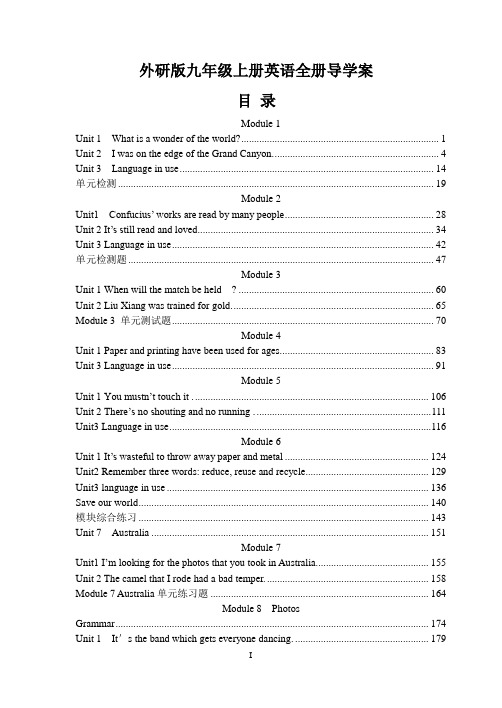
外研版九年级上册英语全册导学案目录Module 1Unit 1 What isa wonder of the world? (1)Unit 2 I was on the edge of the Grand Canyon. (4)Unit 3 Language in use (14)单元检测 (18)Module 2Unit1 Confucius‘ works are read by many people (28)Unit 2 It‘s still read and lov ed (34)Unit 3 Language in use (42)单元检测题 (47)Module 3Unit 1 When will the match be held ? (60)Unit 2 Liu Xiang was trained for gold. (64)Module 3 单元测试题 (70)Module 4Unit 1 Paper and printing have been used for ages. (83)Unit 3 Language in use (91)Module 5Unit 1 You mustn‘t touch it (106)Unit 2 There‘s no shouting and no running . (111)Unit3 Language in use (116)Module 6Unit 1 It‘s wasteful to throw away paper and metal (124)Unit2 Remember three words: reduce, reuse and recycle (129)Unit3 language in use (136)Save our world (140)模块综合练习 (143)Unit 7 Australia (151)Module 7Unit1 I‘m looking for the photos that you took in Austr alia. (155)Unit 2 The camel that I rode had a bad temper. (158)Module 7 Australia单元练习题 (164)Module 8 PhotosGrammar (174)Unit1 It's the band which gets everyone dancing. (179)Unit 2 Read on to find out who the winners are. (184)Unit 3 Language in use (188)单元学情检测 (195)Module 9Module 9 Cartoon stories (209)Unit 2 There are several fan clubs in China which have held birthday parties for Tintin.213 Module 9 Cartoon stories (218)Module 10Unit 1 I‘ve got a friend (231)Unit 2 Jamie is a cook whose ideas are changing school dinners (236)Module 10 Fitness (240)Module 10 单元测评 (246)Module 11Unit 2 It was a quiet country village. (260)Unit 3 Language in use (265)单元检测题 (269)Module 12Unit 1 Your host family is meeting you at the airport. (279)Unit 2 Learn English in Los Angeles. (285)Unit 3 Language in use (291)单元测试题 (297)导学案参考答案Module 1 (304)Module2 Great books (306)Module 3 Sporting life (308)Module 4 Great inventions (310)Module 5 Museums (312)Module 6 Save our world (314)Module 7 Australia (316)Module 8 Photos (319)Module 9 Cartoon stories (323)Module 10 Fitness (324)Module 11 Population (327)Module12 Summer in LA. (330)Module 1 Wonders of the world Unit 1 What is a wonder of the world?课型:听说课一.教学目标:1. 熟练掌握本单元的语言点。
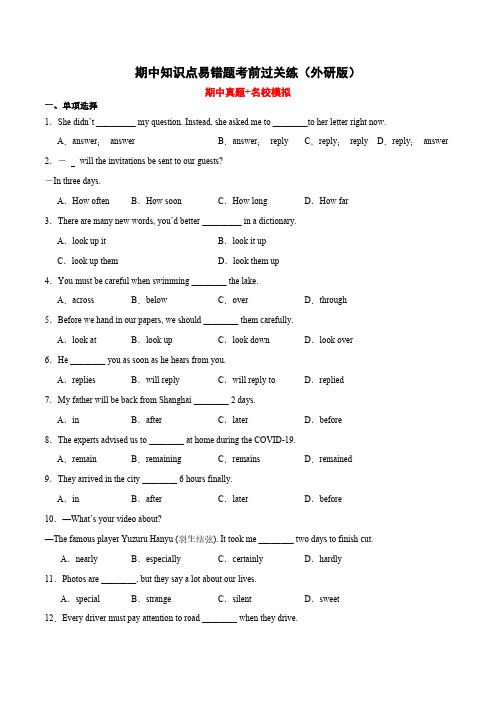
期中知识点易错题考前过关练(外研版)期中真题+名校模拟一、单项选择A.sells B.grows C.lends D.shows25.— Where is your grandpa, Sara?— Look! He is telling stories ________ a group of children over there.A.from B.over C.between D.among26.We can watch the TV show A Lifelong Journey《人世间》, and if you like, we can play games_________.A.also B.neither C.either D.as well27.—Excuse me. Where is the nearest hotel?—Just go down this road _________ you see a library. The hotel is across form it.A.until B.because C.however D.though28.—Susan, do you know if your mother _________ back tomorrow?—Sorry, I don’t know. As soon as she _________ home, I will tell her to call you.A.comes, gets B.will come , got C.will come, will get D.will come, gets29.—What do you feel ____________ you are looking through the old pictures?—How time flies!A.because B.though C.while D.unless30.Camping is a great experience for students. It can help them ________.A.get up B.grow up C.wake up D.hurry up31.It’s necessary for children to have ________ sleep.A.a few B.a number of C.too many D.plenty of32.A recent study in Australia shows that parents are _______ the top five world’s hardest jobs.A.between B.among C.from D.above33.Today is Qingming Festival. It’s a time ________ remembering loved ones who died.A.to B.of C.for D.about34.If you work ________ than before, you can pass the exam.A.hardly B.harder C.hard D.hardest35.Many people like reading newspapers ________ they can learn what’s happening in the world.A.so that B.in order to C.as soon as D.even though36.You must be tired after walking for a long time. Why not stop ________ a rest?A.have B.having C.had D.to have37.They as well as Bob ________ to school by bus every day.A.go B.goes C.went D.going 38.Deng Yaping is very successful, because ________ she does, she always tries her best.A.however B.whatever C.whenever D.wherever 39.—Why don’t you find some workers to repair the computer?—Well, ________ of them want to do such a low-paid job.A.few B.a few C.little D.a little40.I was busy, ________ I didn’t come to your birthday party last night.A.so B.because C.so that D.but41.All the firemen managed ________ out the big fire which was caused by a cigarette end.A.put B.was put C.putting D.to put 42.Last Wednesday when I got to the railway station, I ________ I left my ID card at home.A.thought B.considered C.believed D.realised 43.All the ________ soldiers were sent to hospital at once.A.wound B.hurt C.wounded D.injury44.________ you go, don’t forget where you are from.A.Whatever B.Whenever C.Wherever D.However 45.She studies very hard ________ she could catch up with her classmates.A.so that B.so C.in order to D.because 46.He failed in the English exam ________ he was too careless.A.so B.because C.because of D.so that 47.His Chinese isn’t ________ to speak to us freely.A.good enough B.enough goodC.enough well D.well enough48.Can you help me to ________ my dog when I leave for Hong Kong?A.look after B.look forC.look at D.look through49.Although he felt sick, ________ he still went to work.A.so that B./C.but D.so62.You didn't know the news ___________ he told you.A.until B.because C.if D.after63.Could you please teach me ___________ the computer?A.how to open B.how opening C.how to turn on D.how turning on 64.—Mrs Biggs ________the meeting this morning.Do you know why?—Yes.She went to Shanghai on business the day before yesterday and she won't be back until tomorrow.A.held B.attendedC.missed D.joined65.-Did you see the accident?-No,___________ ,I learned about it from Lily.A.Actually B.Suddenly C.Finally D.Immediately66.Jim is busy preparing his report because Mr Li asked him to ___________ tomorrow morning.A.hand it in B.put it away C.give it up D.pick it up.67.The teachers hope all of us can hand ___________ our homework ___________ time every day.A.up;in B.out;on C.in;on D.on;in68.I'm sorry I ___________ my homework at home.A.leave B.forget C.left D.forgot69.Turn ___________ the TV! Your sister is sleeping.A.off B.on C.up D.in70.—______weather it is! Shall we go for a picnic?— I can’t agree more.A.What a good B.What good C.How good the D.How good71.—I want to go to the new amusement park.—________. Let’s go there together this weekend.A.Me too B.Me neither C.I agree D.I’d love to72.You’d better think it over before you make a decision, ______ you may regret(感到后悔)it.A.and B.but C.so D.or73.Tim, ________ in the hallway! You may fall down and hurt yourself.A.doesn’t run B.not running C.don’t run D.runs74.Look at the sign. It says, “No ________.”A.touch B.touching C.to touch D.touched75.I think Daming is a good student ________ a good player.A.as far as B.as good as C.as well D.as well as76.When you _____ yourself with others, you miss the wonder of who you are.A.compare B.communicate C.contact D.connect77.Dear classmates, may I have your attention, please? I have ________ to tell you.A.anything important B.something importantC.important something D.important anything78.He is ________the bottle ________oil.A.fill; of B.full; of C.full; with D.filling; with79.They can’t allow you ________ the rope.A.cross B.to cross C.crossing D.crosses80.They are looking forward to ___________ to Beijing this summer.A.fly B.flying C.will fly D.flied81.We don't have much homework now and our school bags are ______________ they used to be.A.as heavy as B.as heavily as C.not as heavily as D.not so heavy as82.Mr. Wang is strongly ______________ keeping animals in the zoo,because he thinks animals should also enjoy freedom.A.against B.for C.up D.down83.You can't smoke here;it's ________the rules.A.obey B.follow C.make D.against84.The boy ______________ so much time on the computer games that he didn't have enough time to study.A.cost B.spent C.paid D.took85.______ you ______ Eddie is able to swim, but I am.A.Both; and B.Not only; but alsoC.Either; or D.Neither; nor86.--- What is your favourite sport?--- Swimming, I think. It’s _____ of all.A.easier B.more difficult C.the most interesting D.the most boring87.The fridge doesn't work. Why not consider ________ a new one?A.buy B.bought C.to buy D.buying88.If you don’t want to do that, I will ask Jack ________.A.instead of B.instead C.as well D.either89.— I want to know if Maria ________ us in the fashion show tonight.— I believe if she ________ her homework, she will join us.A.joins; finishes B.will join; finishes C.joins; will finish D.will join; will finish 90.This idea sounds fine. But we should ________ in practice.A.try out it B.try it out C.try on it D.try it on91.To stay healthy, teenagers should have ________ 9 hours’ sleep each night.A.at most B.in face C.at least D.up to92.Why not ________ the program you don’t use from the computer?A.take off B.put off C.get off D.go off93.I am sorry. I took your pen ________.A.by accident B.by the way C.by the time D.by mistake 94.What good news for us! We don’t have to pay for school ________.A.any more B.no more C.so far D.no longer 95.— Did you see the accident?— No.________, I knew about it from Tom.A.Actually B.Suddenly C.Usually D.Immediately 96.Don’t ________ the little boy .After all , he is only 5 years old .A.punish B.warmC.tie D.note97.What new ________ have you learnt through your hobbies?A.pleasure B.results C.skills D.success98.It’s _____for you to keep secrets for your friends. In this way,you can win their trust.A.strange B.necessary C.possible D.lucky99.As students, we should ________ our seat to the old and sick on the crowded bus.A.lend B.offer C.bring D.take100.Tony's mother has warned him ________ up.A.stay B.not staying C.don't stay D.not to stay参考答案:1.B【详解】句意:她没有回答我的问题,而是要求我立刻给她回信。
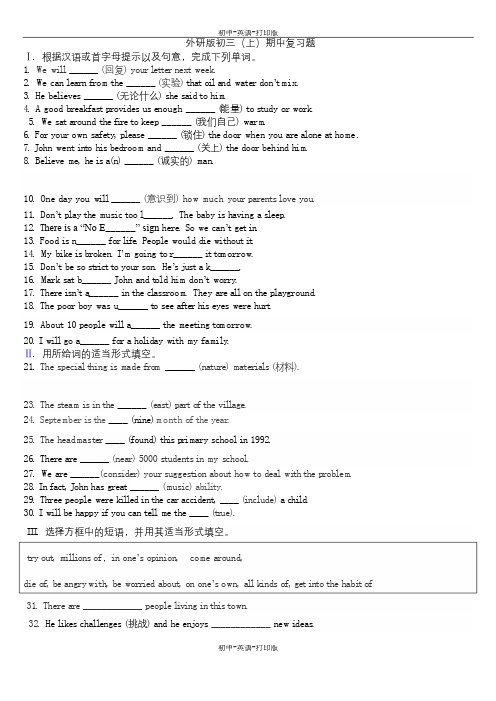
外研版初三(上)期中复习题Ⅰ.根据汉语或首字母提示以及句意,完成下列单词。
1.We wi l l______(回复) your l e t te r nex t week.2.We can l ea rn f rom the ______ (实验)tha t o i l a nd wate r don’t mix.3. He be l i eves ______(无论什么)she sa id to him.4. A good breakfas t p rov ides us e nough ______(能量)to s tudy or work.5.We sa t a round t he f i r e to keep______(我们自己) warm.6. For your own sa fe ty, p lease ______(锁住)the door when you are a lone a t home.7.John went in t o h i s bedroom and ______(关上)the door behind h im.8. Be l ieve me, he i s a(n) ______(诚实的) man.10. One day you wi l l ______(意识到) how much your pa ren t s love you.11. Don’t p lay the mus ic too l______. The baby i s hav ing a s l eep.12. T here is a “No E______” sign here. So we can’t ge t in.13. Food i s n______ fo r l i f e. People would d ie withou t i t.14. My b ike i s broken.I’m go ing t o r______i t tom orrow.15. Don’t be so s t r i c t to your son. He’s jus t a k______.16. Mark sa t b______ John and t old h im don’t wor ry.17. There i sn’t a______in the c l ass room. They are a l l on the p layground.18. The poor boy was u______t o see a f t e r h i s eyes were hur t.19. About 10 people wi l l a______the mee t ing tom orrow.20.I wi l l go a______ fo r a ho l iday wi th my family.Ⅱ.用所给词的适当形式填空。
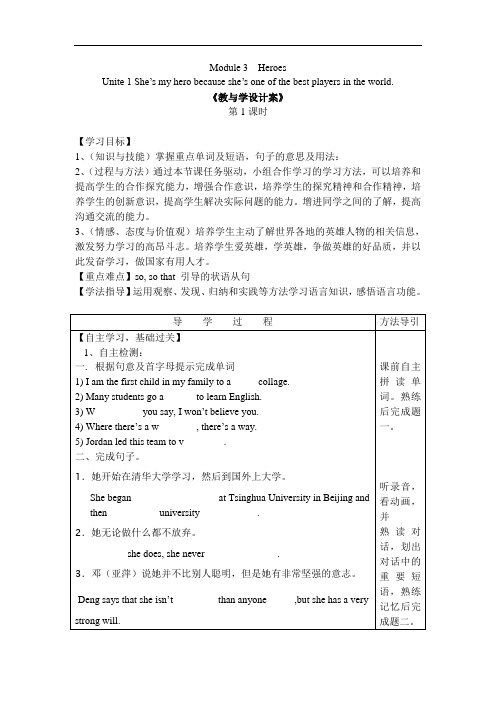
Module 3 HeroesUnite 1 She’s my hero because she’s one of the best players in the world.《教与学设计案》第1课时【学习目标】1、(知识与技能)掌握重点单词及短语,句子的意思及用法:2、(过程与方法)通过本节课任务驱动,小组合作学习的学习方法,可以培养和提高学生的合作探究能力,增强合作意识,培养学生的探究精神和合作精神,培养学生的创新意识,提高学生解决实际问题的能力。
增进同学之间的了解,提高沟通交流的能力。
3、(情感、态度与价值观)培养学生主动了解世界各地的英雄人物的相关信息,激发努力学习的高昂斗志。
培养学生爱英雄,学英雄,争做英雄的好品质,并以此发奋学习,做国家有用人才。
【重点难点】so, so that 引导的状语从句【学法指导】运用观察、发现、归纳和实践等方法学习语言知识,感悟语言功能。
Module 3 HeroesUnit 2 There were few doctors, so he had to work very hard on his own.《教与学设计案》第二.三课时【学习目标】1、(知识与技能)掌握下列重点单词及短语,句子的意思及用法:(1).Words :army, Canada, Canadian, medical, treat, treatment, Dr(=doct-or), war, inv ent, tool, operate, operation(2). Phrases: give one’s life to 献身于, save one’s life 救某人的生命, in spite of 尽管, in the end 最后, take care of 照顾, stop to do sth 停下来去做某事, stop doing sth.继续做某事, both…and………和……都(3).Important sentences:1.He soon realised that many people were dying because they did not get to hospital quickly enough.2. Dr Bthune often worked very hard without resting or taking care of himself.3.In the end, he died of his wound.2、(过程与方法)通过本节课任务驱动,小组合作学习的学习方法,可以培养和提高学生的合作探究能力,增强合作意识,培养学生的探究精神和合作精神,培养学生的创新意识,提高学生解决实际问题的能力。
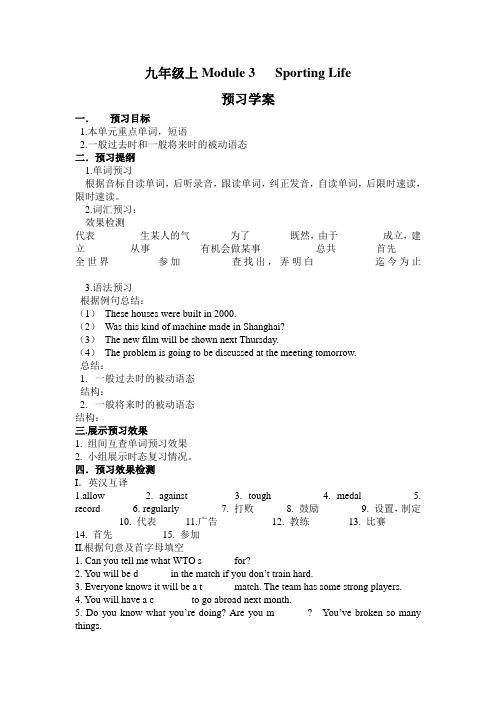
九年级上Module 3 Sporting Life预习学案一.预习目标1.本单元重点单词,短语2.一般过去时和一般将来时的被动语态二.预习提纲1.单词预习根据音标自读单词,后听录音,跟读单词,纠正发音,自读单词,后限时速读,限时速读。
2.词汇预习:效果检测代表_________生某人的气________为了________既然,由于________ 成立,建立________ 从事_________ 有机会做某事__________ 总共_______ 首先_____ 全世界________ 参加_______ 查找出,弄明白__________迄今为止___________3.语法预习根据例句总结:(1)These houses were built in 2000.(2)Was this kind of machine made in Shanghai?(3)The new film will be shown next Thursday.(4)The problem is going to be discussed at the meeting tomorrow.总结:1.一般过去时的被动语态结构:__________________________________________2.一般将来时的被动语态结构:__________________________________________三.展示预习效果1. 组间互查单词预习效果2. 小组展示时态复习情况。
四.预习效果检测I.英汉互译1.allow_______2. against_______3. tough________4. medal________5. record______6. regularly________7. 打败______8. 鼓励________9. 设置,制定________ 10. 代表_____ 11.广告__________ 12. 教练______ 13. 比赛_______ 14. 首先________ 15. 参加_____II.根据句意及首字母填空1. Can you tell me what WTO s______ for?2. You will be d______ in the match if you don’t train hard.3. Everyone knows it will be a t______ match. The team has some strong players.4. You will have a c_______ to go abroad next month.5. Do you know what you’re doing? Are you m______ ? You’ve broken so many things.III. 翻译句子1. 上次你们被打败了。
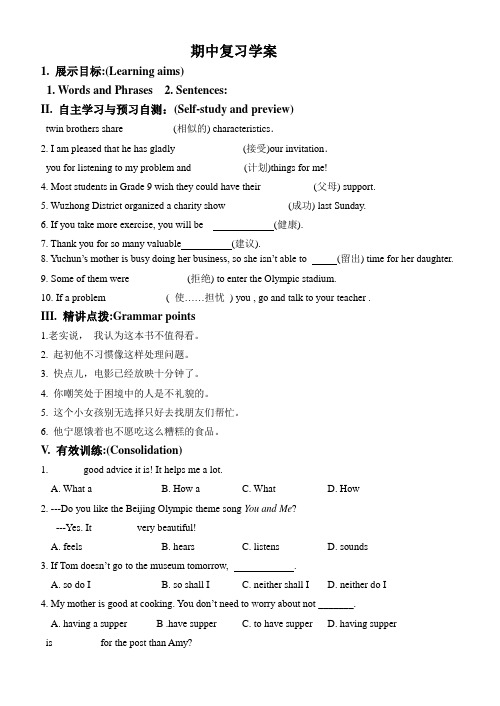
期中复习学案1. 展示目标:(Learning aims)1. Words and Phrases2. Sentences:II. 自主学习与预习自测:(Self-study and preview)twin brothers share__________(相似的) characteristics.2. I am pleased that he has gladly _____________(接受)our invitation.you for listening to my problem and__________ (计划)things for me!4. Most students in Grade 9 wish they could have their __________(父母) support.5. Wuzhong District organized a charity show ____________(成功) last Sunday.6. If you take more exercise, you will be (健康).7. Thank you for so many valuable (建议).8. Yuchun’s mother is busy doing her business, so she isn’t able to (留出) time for her daughter.9. Some of them were ___________(拒绝) to enter the Olympic stadium.10. If a problem ___________ ( 使……担忧) you , go and talk to your teacher .III. 精讲点拨:Grammar points1.老实说,我认为这本书不值得看。
2. 起初他不习惯像这样处理问题。
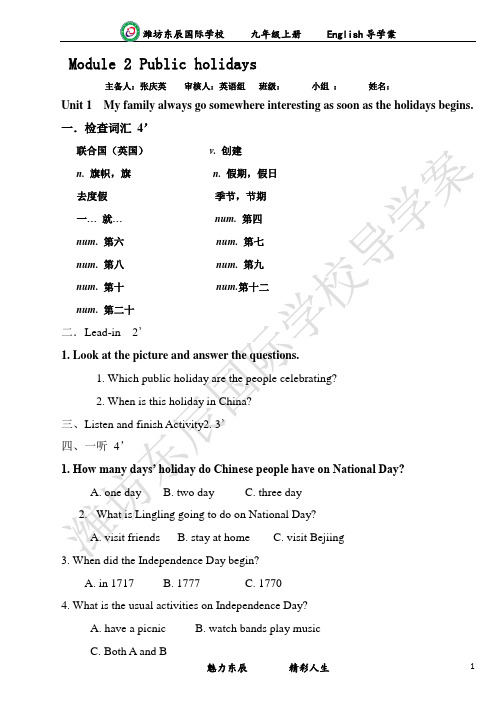
Module 2 Public holidays主备人:张庆英审核人:英语组班级:小组:姓名:Unit 1 My family always go somewhere interesting as soon as the holidays begins.一.检查词汇4’联合国(英国)v. 创建n.旗帜,旗n.假期,假日去度假季节,节期一…就… num.第四num. 第六num. 第七num. 第八num. 第九num. 第十num.第十二num. 第二十二.Lead-in 2’1. Look at the picture and answer the questions.1. Which public holiday are the people celebrating?2. When is this holiday in China?三、Listen and finish Activity2. 3’四、一听4’1. How many days’ holiday do Chinese people have on National Day?A. one dayB. two dayC. three day2.What is Lingling going to do on National Day?A. visit friendsB. stay at homeC. visit Bejiing3. When did the Independence Day begin?A. in 1717B. 1777C. 17704. What is the usual activities on Independence Day?A. have a picnicB. watch bands play musicC. Both A and B5. What public day does people celebrate in the UK?A. National DayB. Independence DayC. Christmas 二听4’一、检查词汇:3’prep. 在……之中n. 演说;讲演n. 开拓者;先驱者v. 种植,栽培(植物)n. 谷物;玉米adj. 接着的;接下来的v. 摆放(餐桌)摆放餐桌adj. 完了的;结束的n. 盘;碟n.(庆祝)游行pron. 我们自己二、lead-in 视频导入4’What do you know about Thanksgiving? What is it?三、1)Fast reading 3’Read the passage and match the headings with the paragraphs.a) A special dinner. b) An American festival.c) The history of the festival.d) Things to do during the festival.2)careful reading 10’Read para.1 and choose the best answer1. Thanksgiving Day is a(an) _____ festival. A. English B. American C. Chinese2.It is celebrated on the ____ Thursday in November. A. second B. third C. fourth3. People give thanks for ______. A. the food B. their friends C. the familyRead para.2 History of thanksgiving1. We ___ ____ the festival since the first ______ from England ______ in America by ship in the seventeenth century.2. The local people ,_____________taught the pioneers ___ ___ ____ ____.3. The following year they celebrated together by _____________________.Read para3. and 4. How to celebrate Thanksgiving today.1.We still celebrate Thanksgiving today with ___.We ________, and then before we begin dinner, my father ________ for the food, so weLanguage points :练习题:5’1.He will spend six hours at his desk____ he finishes his composition.A. beforeB. untilC. afterD. when2.I knocked at the door for more than five minutes ____ Mrs. White answered it.A. untilB. whenC. afterD. before3. He was about to go to bed ________ the doorbell rang.A. whileB. asC. beforeD. when4. _____ John was watching TV, his wife was cooking.A. AsB. As soon asC. WhileD. Till反思:Module1 Wonders单词检测:1.人造的________________2. 大自然的________________3. 奇迹,奇观_________________4. 讨论,商讨__________________5. 在东边的__________________6. 虽然,但是___________________7. 响亮的____________________8. 看法,主张___________________9. 据某人看来____________________10. 超过__________________11.电_____________________12. 大量的____________________13. 在下面____________________14. 照耀____________________15. 迹象,标志___________________16. 寂静的___________________17. 银灰色的____________________18. 天空,天__________________19. 灰色的____________________20. 穿过___________________21. 在…..旁边_____________________22. 答复,回答_________________23. 开始消失____________________24. 突然向下倾斜_________________25. 小河,小溪____________________26. 几乎,差不多____________________27. 在….上面, 盖住________________28. 峡谷______________________ 29. 逗留,留下_______________ 短语检测:1.自然奇迹2.人造奇迹3.一个古老的奇迹4.一个现代奇迹5.参加讨论6.同意某人的观点7.在北爱兰的东海岸8.发电9.下了小汽车10.出现在小路旁11.穿过一扇门12.五分钟后13.朝下看14.云消散15.在…底端16.眺望17.在两边18.倾斜19.去过某地20去了某地∙让我们加入讨论吧。

外研版九年级上册英语全册导学案目录Module 1Unit 1 What isa wonder of the world? (1)Unit 2 I was on the edge of the Grand Canyon. (4)Unit 3 Language in use (14)单元检测 (18)Module 2Unit1 Confucius‘ works are read by many people (28)Unit 2 It‘s still read and lov ed (34)Unit 3 Language in use (42)单元检测题 (47)Module 3Unit 1 When will the match be held ? (60)Unit 2 Liu Xiang was trained for gold. (64)Module 3 单元测试题 (70)Module 4Unit 1 Paper and printing have been used for ages. (83)Unit 3 Language in use (91)Module 5Unit 1 You mustn‘t touch it (106)Unit 2 There‘s no shouting and no running . (111)Unit3 Language in use (116)Module 6Unit 1 It‘s wasteful to throw away paper and metal (124)Unit2 Remember three words: reduce, reuse and recycle (129)Unit3 language in use (136)Save our world (140)模块综合练习 (143)Unit 7 Australia (151)Module 7Unit1 I‘m looking for the photos that you took in Austr alia. (155)Unit 2 The camel that I rode had a bad temper. (158)Module 7 Australia单元练习题 (164)Module 8 PhotosGrammar (174)Unit1 It's the band which gets everyone dancing. (179)Unit 2 Read on to find out who the winners are. (184)Unit 3 Language in use (188)单元学情检测 (195)Module 9Module 9 Cartoon stories (209)Unit 2 There are several fan clubs in China which have held birthday parties for Tintin.213 Module 9 Cartoon stories (218)Module 10Unit 1 I‘ve got a friend (231)Unit 2 Jamie is a cook whose ideas are changing school dinners (236)Module 10 Fitness (240)Module 10 单元测评 (246)Module 11Unit 2 It was a quiet country village. (260)Unit 3 Language in use (265)单元检测题 (269)Module 12Unit 1 Your host family is meeting you at the airport. (279)Unit 2 Learn English in Los Angeles. (285)Unit 3 Language in use (291)单元测试题 (297)导学案参考答案Module 1 (304)Module2 Great books (306)Module 3 Sporting life (308)Module 4 Great inventions (310)Module 5 Museums (312)Module 6 Save our world (314)Module 7 Australia (316)Module 8 Photos (319)Module 9 Cartoon stories (323)Module 10 Fitness (324)Module 11 Population (327)Module12 Summer in LA. (330)Module 1 Wonders of the world Unit 1 What is a wonder of the world?课型:听说课一.教学目标:1. 熟练掌握本单元的语言点。
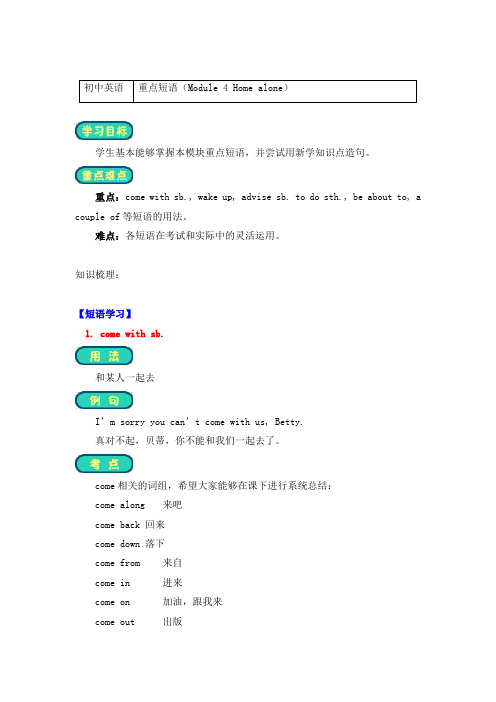
初中英语重点短语(Module 4 Home alone)学生基本能够掌握本模块重点短语,并尝试用新学知识点造句。
重点:come with sb., wake up, advise sb. to do sth., be about to, a couple of等短语的用法。
难点:各短语在考试和实际中的灵活运用。
知识梳理:【短语学习】1. come with sb.和某人一起去I’m sorry you can’t come with us, Betty.真对不起,贝蒂,你不能和我们一起去了。
come相关的词组,希望大家能够在课下进行系统总结:come along 来吧come back 回来come down 落下come from 来自come in 进来come on 加油,跟我来come out 出版请用相关词组填空:come back come out come from① She ________________ China.② His book ________________ last year.③ She didn’t have supper until her mother _______________. 答案:comes from, came out, came back思路分析:结合具体句意得出答案。
2. wake up叫醒There won’t be anybody to wake you up in the morning.每天早晨不会有人叫醒你。
wake在这里用作及物动词。
Try not to wake the baby up.wake还有不及物动词的用法,表示“醒来”What time do you usually wake (up) in the morning?翻译句子:我今天早晨起得很早。
答案:I woke up very early this morning.思路分析:注意这里是wake作为不及物动词的用法。
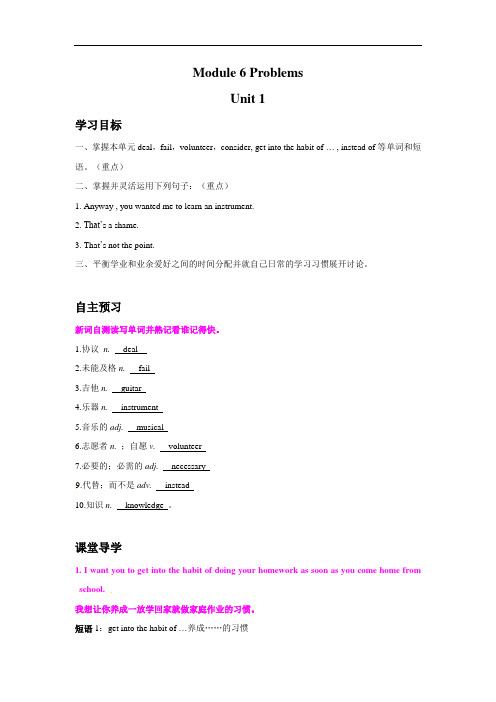
Module 6 ProblemsUnit 1学习目标一、掌握本单元deal,fail,volunteer,consider, get into the habit of … , instead of等单词和短语。
(重点)二、掌握并灵活运用下列句子:(重点)1. Anyway , you wanted me to learn an instrument.2. That’s a shame.3. That’s not the point.三、平衡学业和业余爱好之间的时间分配并就自己日常的学习习惯展开讨论。
自主预习新词自测读写单词并熟记看谁记得快。
1.协议n.deal2.未能及格n.fail3.吉他n.guitar4.乐器n.instrument5.音乐的adj.musical6.志愿者n.;自愿v.volunteer7.必要的;必需的adj.necessary9.代替;而不是adv.instead10.知识n.knowledge 。
课堂导学1. I want you to get into the habit of doing your homework as soon as you come home from school.我想让你养成一放学回家就做家庭作业的习惯。
短语1:get into the habit of …养成……的习惯habit作名词,意为“习惯”,常用短语get into the habit of …,意为“养成……的习惯”。
We should get into the habit of obeying school rules and regulations.我们应该养成遵守学校规章制度的习惯。
This will help you get into the habit of being tidy.这将帮助你养成整洁的习惯。
即学即练一根据汉语意思完成句子你不能染上吸烟的坏习惯。
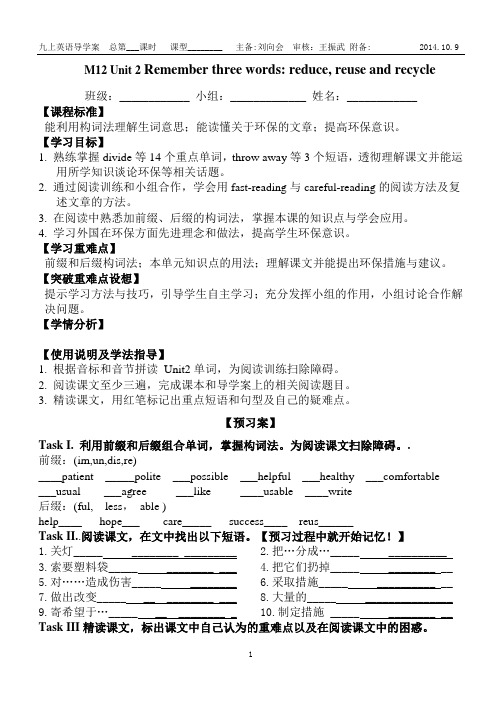
M12 Unit 2 Remember three words: reduce, reuse and recycle班级:____________ 小组:_____________ 姓名:____________【课程标准】能利用构词法理解生词意思;能读懂关于环保的文章;提高环保意识。
【学习目标】1. 熟练掌握divide等14个重点单词,throw away等3个短语,透彻理解课文并能运用所学知识谈论环保等相关话题。
2. 通过阅读训练和小组合作,学会用fast-reading与careful-reading的阅读方法及复述文章的方法。
3. 在阅读中熟悉加前缀、后缀的构词法,掌握本课的知识点与学会应用。
4. 学习外国在环保方面先进理念和做法,提高学生环保意识。
【学习重难点】前缀和后缀构词法;本单元知识点的用法;理解课文并能提出环保措施与建议。
【突破重难点设想】提示学习方法与技巧,引导学生自主学习;充分发挥小组的作用,小组讨论合作解决问题。
【学情分析】【使用说明及学法指导】1. 根据音标和音节拼读Unit2单词,为阅读训练扫除障碍。
2. 阅读课文至少三遍,完成课本和导学案上的相关阅读题目。
3. 精读课文,用红笔标记出重点短语和句型及自己的疑难点。
【预习案】Task I. 利用前缀和后缀组合单词,掌握构词法。
为阅读课文扫除障碍。
.前缀:(im,un,dis,re)____patient _____polite ___possible ___helpful ___healthy ___comfortable___usual ___agree ___like ____usable ____write后缀:(ful, less,able )help____ hope___ care_____ success____ reus______Task II..阅读课文,在文中找出以下短语。
【预习过程中就开始记忆!】1.关灯_____ ________ _________2.把…分成…_____ __________3.索要塑料袋_____ ________ ___4.把它们扔掉_____ ________ __5.对……造成伤害_____ ________6.采取措施_____ __________ __7.做出改变_____ __ ________ ___8.大量的_____ _______________9.寄希望于…_____ __ ________ _ 10.制定措施 _____ ________ __ Task III精读课文,标出课文中自己认为的重难点以及在阅读课文中的困惑。
外研版英语九年级上册期中复习语法复习一、动词的六种时态二、时间状语从句1.时间状语从句由________________________________________________________引导。
2.原因状语从句由___________________________引导。
3.目的状语从句由___________________________引导。
4.结果状语从句由___________________________引导。
5.让步状语从句由___________________________引导,不能和_______ 连用。
6.条件状语从句由______ 引导,主句用_______________时态, 从句用____________________时态。
7.表示“禁止做某事”(1)________________(2)__________________(3)___________________知识清单Module 1一、单词wonder opinion shine /shone beside nearly discussion eastern though electricity natural reply grey remain strangers silent sign二、词形变换1.discuss ---- discussion 讨论2.east ---- eastern 东方的3.strange--- stranger(s) 陌生人4.silence= silent 静静的5.shine--- shone---shone 照耀6. rise --- rose---risen 上升三、句型1.look forward to doing sth. 盼望做某事2.refuse to do sth. 拒绝做某事四、短语1.agree with sb. 同意某人2.on the eastern coast of... 在......的东海岸3.in one's opinion 按某人的意见lions of 大量的,无数的5.go through 穿过6.reply to 回答7.in five minutes 5分钟后(常用于一般将来时)8.look over查看;检查9.fall away 突然向下倾斜10.look across 眺望,看向11.look down 俯视12.on top of 在.....的顶部13.at the bottom of 在······的底部14.on both sides 在两侧五、其他1.join + 组织,群体;join in + 活动,游戏2.though 引导让步状语从句,不能和but连用。
3.two hundred/ thousand /million 两百/千/百万4.as soon as ,if引导的状语从句用一般现在时,主句用一般将来时(主将从现)Module 2一、单词found flag until vacation season ninth twentieth dishes among speech lay/laid plenty twelfth once pioneer grow following ourselves二、词形变换1.found ---- founded2.follow ----followingy—laid—laid4.we---ourselves5.you---yourselves6.they--themselves7.speak---speech三、句型1.have fun doing sth. 做某事玩得开心2. It’s time for + 名词3. It’s time to do sth 到了做某事的时间4.by doing sth. 通过做某事四、短语1.National Day 国庆节2.since then 从那以后(用在现在完成时)3.a three-day(three days') holiday 三天的假期4. not ...until... 直到...才...5.all kinds of 各种各样的6.take a vacation 去度假7.have fun 玩得高兴8.as soon as 一……就……9.make speeches /make a speech 做演讲10.give thanks for sb 对……表示感谢11.by ship 坐轮船y the table 摆设桌子13.tell stories / tell a story 讲故事14. as well 也;还15.plenty of = lots of 大量的16.enjoy oneself 玩得开心五、其他1. off 不上班, 休息2.all kinds of (+复数名词)各种各样的3.something /anything + 形容词4.as soon as 一……就……,用来引导时间状从句(主句用将来时,从句用一般现在时)5.序数词表示顺序,一般前面有“the”或形容词。
6. between “在两者之间”,among “在三者或三者以上之中”7.too much +不可数名词;much too +不可数名词;too many +复数名词8.plenty of = lots of 大量的(用于修饰可数名词数或不可数名词)9.enough的用法:放在名词前;放在形容词或副词后10.A as well as B (动词参考主语A);Not only A but also B (动词参考主语B)Module 3一、单词attend including abroad whatever will victory Canadian realise invention useful operation amazing wound dying himself continue二、词形变换1.hero---heroes 英雄2.include----including 包括3.amaze---amazing (事物)---amazed(人)4.Canada --- Canadian 加拿大的,加拿大人5.wound--- wounded 受伤的6.die---dying 垂死的7.invent---invention(发明)--- inventor(发明家)e ---useful 有用的9.he---himself she---herself it---itself10.operate---operation 手术三、句型1.choose to do sth. 选择做某事2.stop doing sth停止做某事(表示不再做这件事)3. stop to do sth 停下来做某事(另外一件)4.give up doing sth. 放弃做某事5.help do sth. 帮做某事6.without doing sth. 没有做某事7.manage to do sth. 设法做某事.四、短语1.seven years later 七年后2.give up 放弃3.a strong will 坚定的意志4.as well as 不仅…而且;除了…还5.die for 为……而死6.take care of = look after 照顾7. save one's life(lives) 挽救某人的生命8.at that time 那时候9.on one's own = alone / by oneself 独自10.die of 死于五、其他1.enough修饰形容词或副词,位于其后2.时间段+ later “……以后”,用于一般过去时; in + 时间段“……以后”,用于一般将来时。
3.as well as 连接并列主语,谓语动词和前面一个主语在人称和数上保持一致。
4.the sick 病人5.so that “目的是”---- 引导目的状语从句;so... that... “如此......以致”-----引导结果状语从句6.die of 死于内因(身体内部的伤/病/饿/寒冷);die from死于外因(主要指事故等方面的)Module 4一、单词meeting couple passenger address shut message order empty simple job business tidy burnt unhappy unable task二、词形变换1.shut ---shut ---shut2.manage---manager 经理3.happy--unhappy---happily4.burn---burnt---burnt 烧焦5.worry---worried6.able---unable7.wake--woke8.busy---business三、句型1. It’s important for sb.to do sth. 做某事对某人重要2. make sure to do sth. 确保做某事3.be about to do sth. 将要做某事4. order sb. to do sth. 命令某人做某事5.be worried about doing sth 担心做某事6.be unable / able to do sth 不能/能够做某事7.be busy doing sth. 忙于做某事四、短语1. train number 列车车次2. So am I. 我也是。
3. be careful with 小心……4.make sure确保5.wake sb. up 叫醒某人6. so ... that 如此……以至于……7. text message 短信8. a couple of 几个,两个9.feel (be) unhappy with... 对......不满意10.turn off 关闭11.turn on 打开12.be bored with 对……厌烦e true 实现14.be worried about 担心15.on business 出差16.at last = in the end 最后17.wake /woke up 醒来18.hurry to ... 匆匆忙忙去……19.hand in 上交20.all day long 一整天21.help sb. with sth. 在某方面帮助某人22.tidy up 打扫;清理五、其他1. 倒装句:So am I. 我也是。